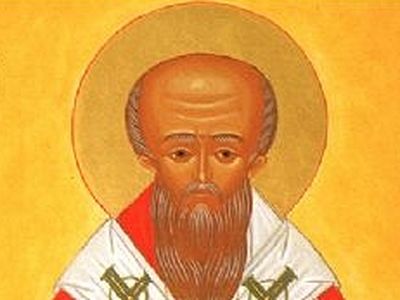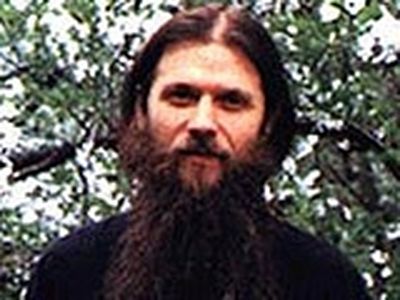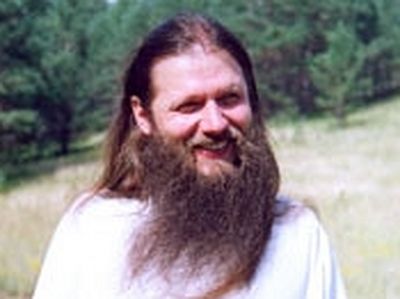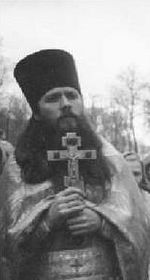
Road to Emmaus: Father Artemy, would you please tell us a little about your background and education? Was your family outspokenly Orthodox? Did you go to church regularly?
Fr. Artemy: At the beginning I would like to apologize for my poor English. My vocabulary is not so broad as to express all the shades of meaning that I have in my heart. Therefore my readers may be a little inconvenienced by my lack of words, but my aim will be to make the point. I was born in 1961, the year the first Soviet Cosmonaut found himself orbiting the earth. Certainly, I was not brought up in an outspokenly Orthodox family. We were baptized, but that is all. I suppose that my grandmother considered herself a Christian, but she didn’t attend services until she became ill with cancer. Then, she returned to the church. I remember that on Sundays she used to tell us, “Oh, it was so sweet in the church. My soul was resting… It was so good… I had Holy Communion.” But we three grandsons didn’t understand her, and were even a little irritated by these confessions. Although there was a church on the street where we lived, I never paid any attention to the bells that rang on Sunday morning. It was as if I was deaf and dumb. Now I understand what our Saviour meant when he spoke of people who close their eyes and ears and harden their hearts. I was noticeably influenced by the Soviet schools, and I remember the day my grandmother first tried to lead me to a church. The moment I smelled the aroma of the incense and saw the mystical darkness of the interior, I stopped on the steps, turned, and ran away—not understanding why I wanted to escape. I also remember an atheist who visited our school, lecturing on how he had become an unbeliever after graduating from the seminary. In an interview in the newspaper, he had denied everything he had believed in, and I was rather impressed by his personality. I was also impressed by the enumeration of the disciplines he had studied in the seminary: it was a sort of advertisement that he made of himself. When I came home and narrated my impressions to my grandmother, I remember that her eyes filled with pain and sorrow, but she didn’t argue with me. I was a Pioneer,* and I said to her as a sort of protest, “…and that clever man doesn’t believe in God.”
RtE: You mean he went to the seminary and then stopped believing?
Fr. Artemy: He was sent to the seminary like a Trojan
Horse. My grandmother didn’t argue with me, she only
replied, “I don’t think he can be a good
man.” Nevertheless, our family was not a Soviet one.
No one was Communist, and my parents, who were of the
Russian intelligentsia of the 50’s and
60’s—they were both physicists—were
critical of the Soviet power, although they were never
dissidents. Some deep roots of Christianity still
remained, however, and every Pascha our grandmother tried
to take us to watch the Cross procession pass, to listen
to the choir, and then to come back to taste kulichi and
pascha.
We never went to church regularly, and we never heard
anything about God, nor were we taught to pray. It was
only after my grandmother’s death that I found a
wooden box with an icon of Jesus Christ, holding in His
hands the chalice and bread of the Holy Supper. This is
now my most precious icon, and I pray in front of it.
RtE: How did you become Orthodox?
* A Young Pioneer—a member of the state-run youth groups that were almost mandatory for Russian school-children. The groups had an emphasis on cultural, artistic, sport and outdoor programs, with the Soviet philosophy heavily underlying all activities.
Fr. Artemy: I was baptized when I was three years old, and gave my first confession when I was eighteen. I was a student of the philological faculty at the university.
RtE: Was there any point in your life when, like the disciples, you met the Lord on your own road to Emmaus?
Fr. Artemy: Yes. There was a particular point, certainly.
Being rather a callous young man, a university student, I
didn’t have a mild heart—although, certainly,
it wasn’t the heart of a Mafioso. The first
visitation of our Lord was when our grandmother died. I
remember her last words, which she whispered as my twin
brother and I sat by her bed in the hospital. It was like
a testament: “I would like you to become good
people.” She was inspired, and her death was very,
very light. She astonished the medical sisters [nurses]
with her noble behavior. She didn’t complain, she
wouldn’t ask anyone for anything, and God’s
grace certainly manifested in the last weeks of her life.
After her death something changed in our family; it was as
if a dark shadow was lifted. There was a feeling of
eternity, as if blinders had been removed. I still
remember the night of her death, the first night of my
life that I didn’t sleep. It was not yet prayer for
me, it was emotional pain. I thought about her, about how
loving she was, and I cried a little. I hadn’t
thought about these things before. It was an emotional
state, and now I understand that it was a very appropriate
moment for heavenly grace to touch my heart. I was trying
to find the link that had broken in our communication with
our grandmother, and my soul would not sleep. I was
searching for this spiritual path, but I did not know how
to touch it. I didn’t believe that she had died, but
I couldn’t find the thread between the visible and
invisible worlds. I began to write poems where for the
first time God was present, and I tried to look very
attentively at her photographs. This was the first time
that I felt that the visible world was somehow
transparent, and that there must be a way to move beyond
it. Sometime later, I went back to the same church that I
hadn’t been able to enter six years before. I
didn’t know what awaited me. As I entered I saw a
large icon of our Saviour in a white garment, with His
hands spread out, as if saying, “Come to Me all you
who labor and are heavy laden, and I will give you
rest.” This icon was an original work painted by the
Russian new-martyr, Metropolitan Seraphim Chichagov, who
wrote the famous narrative about St. Seraphim of Sarov,
the Chronicles of St. Seraphim of Diveyevo. The face of
our Saviour in the icon was pale, and His eyes followed
you wherever you stood. Three or four old ladies, old
Moscow intelligentsia with very feeble voices, were
singing the Beatitudes…. “blessed are the
pure of heart, for they shall see God…” At
that moment I found what I was searching for, because, all
of a sudden (I could never have predicted it, or believed
it possible) as I stood in front of the icon, I understood
that the living God was inviting me to follow Him, to
approach Him. In that moment, my heart found everything
that it needed. I didn’t notice the time, and when
the priest appeared with the chalice I understood that it
was for me. I couldn’t have said what it was, Who it
was, but I saw that people crossed their hands on their
breasts and approached, and I did so also.
As I came up to him the priest said, “My dear, my
dear, milinki [my sweet]—have you confessed?”
His voice was very warm. He was not rude or hard, upset or
indignant, as we priests can be in this situation. I still
remember that the first words of the priest were very warm
and delicate; otherwise, I would never have returned to
the church as I did a month later. I said, “No, I
haven’t.”
RtE: Did you know what confession was?
Fr. Artemy: I was not ignorant. I was a philologist, a
student. I was thinking about life. Certainly, I guessed
what confession was, although I did not know how to go
about it. “Wait a little bit,” he said,
“I will talk with you, and then you will approach
the chalice.” And so, I turned away—but I
didn’t stay in church, I wasn’t ready. When I
made my way out to the street, I suddenly began to cry
like a child. I didn’t know why I was crying, but
later I understood that these were tears of purification
cleansing my heart. It was not yet repentance, but it was
certainly the visitation of heavenly grace. One month
later, as I was sitting in the library preparing to read a
pile of dull volumes I suddenly found in my stack a book
about St. Theodora and her post-mortal experience with the
toll-houses. Even now I don’t know where this little
book came from. Who could have given it to me? Was it a
mistake by the librarian? It was as if it had just dropped
from heaven. *
As I began reading, everything around me ceased to exist.
I began to write down everything I was reading, and my
whole life—all my sins—became visible, even to
small details. Maybe not everything, but this was the
first investigation of the depth of my heart.
*(At that time religious censorship was still in force,
and even if the book had been available in the library, it
would have required special permission to read it.) In the
tenth century, St. Basil the New recorded that his
disciple, Gregory, had had a vision of a woman named
Blessed Theodora, who showed him in detail the path of
souls after death, and how they go through a series of
“toll-houses,” to be examined for specific
sins and virtues. Although this is not a formally-held
Orthodox doctrine, it is a widely accepted and oft-quoted
part of Church tradition.
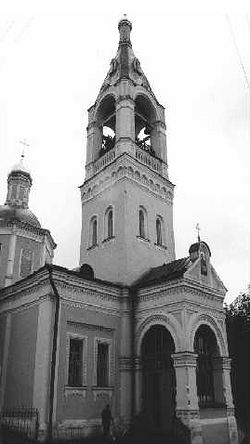
RtE: Can you tell us more about the conflicts between your professional life as a teacher and your Orthodoxy?
Fr. Artemy: Yes, I was an upper-level school teacher of Russian language and literature. It was a great happiness. The opportunity of teaching children taught me many important things because this occupation is quite close to the priesthood. The main characteristic of a teacher is love for children, and if you love them you can heal their souls and discern what they really need. Being a Christian teacher in a Soviet school I felt that I couldn’t give them everything that I should. Even at that time my soul understood that the priesthood is the highest devotion in the world, and I was very attentively studying the character of the priesthood and visiting priests whom I already knew. Certainly, there was a conflict between my Orthodoxy and my professional life. I couldn’t lie to my pupils. I could never teach them that the October 1918 Socialist Revolution was something good. Everything was permeated with this Soviet ideology, and literature and history were the objective foundations of the conflict. Certainly the directors of both schools felt that something was wrong. When the principal of the first school dismissed me, she said, “I respect you as a man, I love you like a son, but as a Communist, I can’t have you in this school.” So I was banished, once, then twice. But God’s Providence covered me and led my soul along the path that He had planned for me.
RtE: When and how did you begin to learn English?
Fr. Artemy: When I was about twelve, I began to study in a specialized English school, but my knowledge of the language was so poor that I couldn’t express my thoughts or feelings freely. One day I didn’t go to school, but wandered about near the church where I lived. Suddenly, a desire arose in my heart to study English. I was rather lazy, but nevertheless, every Saturday, Sunday and most evenings I sat in my room with modern English books— they were rare in the 70’s. Then, I took up Mister Pickwick in the original,* and using a dictionary I tried to write down the unknown words. All the words were unknown, and as this was insufficient, I began writing vocabulary notes—for example “To get”, with all the prepositions; “get off,” “get up,” “get in,” “get through,” and all the idiomatic expressions. So, there were many copybooks, thick ones. Perhaps it was the integrity of a young heart, but I very systematically read through my copybooks with all these new words and grammar points. It was not a month-long ordeal—it was one year, then a second. Very soon progress was made. I began reading and speaking rather fluently, and this path determined my entering the university.
RtE: What a wonderful beginning. Thank you. Can you tell us now a little of the history of the Church of All Saints, where you serve?
Fr. Artemy: The Church of All Saints was the last church built in the Moscow women’s monastery dedicated to St. Alexis, Man of God. It was built near the cemetery, which was completely destroyed during the Soviet times, living house of God, certainly they won’t remain in church. A huge cathedral can be like a supermarket, with some queues, some gulf-streams of people placing candles, migrating from one corner to another. We are to remember the words of Jesus Christ, “My house is a house of prayer, not a den of thieves.” I try to communicate with people, and not only during the services. We have evening meetings where people have a chance to listen to an explanation of the Scriptures, ask questions, pray for some special needs-everything that helps us feel like one family. I hope that the main mission of my parish is to teach people to pray, to teach them to stand before the face of God, so that in the domain of their hearts they can approach God and repent like children before the face of the Heavenly Father. I think this is the main task for all of us.
RtE: What kind of activities is the church involved in, and what is your own day like?
Fr. Artemy: Our brotherhood, dedicated to St. Philaret,
Metropolitan of Moscow, has a very broad program-our
school for children (my matushka is the director), our
home for old people, the little publishing house… I
have a strong desire to begin my day visiting the church.
When I manage to realize this, I am happy, particularly
when I serve Holy Liturgy. People don’t hurry to
leave the church. There are always many questions, and not
only questions but they also need to open their hearts, to
explain things. It is not easy to make one’s way
through the circuit of people. Some of them come for a
first confession, or preparation for baptism, or a talk
before their Church marriage…
More and more poor people come to our church every day
from the railway station with the most amazing stories.
They all sound similar-"We were arriving in Moscow
from Vladivostok, and we were robbed on our way. We
don’t have our documents, but only a notice from the
militia that we need help. Please help us…”
“We are going home…” “We have
buried our close relative…” “We live at
the railway station.” It is not easy to find out if
they are telling the truth, and my principle is, if they
lie it is a crime-it is a crime to lie to a priest. If I
feel that they are not telling the truth, I try to be hard
and severe, but if their lie is not so enormous, maybe
only parts of their story aren’t true, certainly we
try to help them. My principle is to not let people go
without any help. Maybe you can’t help them with the
whole problem, but at least give them something to eat, a
little money, so that they feel that God is alive, that He
exists, and that He is here in His church. Many of them
have no hope that someone will help them because our life
is very cruel. When they see that help is forthcoming,
their eyes shine with hope. Certainly, we are happy in
Russia that our priests are not to work in addition to
their church service. If you give your heart to people you
will never need an additional job, because people
won’t ever let you have a need for anything. We have
no State funding, the State does not help us as in Greece.
Here in Moscow we exist owing to alms, and these alms can
be quite varied. Not only food and fruit, for example, but
a good car. I don’t have to go to shops at all. No.
And the moment that I feel something is needed- a pair of
boots, a scarf, an overcoat-everything is sent
immediately. It is just horrible, because you feel the
responsibility. And even more, you have the evidence that
the moment you give something in the name of the Lord, you
will be given twice or thrice more. For example, early
this morning on my way to church, there was an old woman
with her daughter. They were very poor and the victims of
these railway station stories. Their faces were the best
witness of their hard lives, and I prepared to listen to
their story, which was quite similar to other stories. My
point was to find out whether they were telling me the
truth or trying to disorient me. “To give, or not to
give?” That was the question. Certainly you try not
to analyze rationally, but to feel something, because if
they are asking, it is life itself that has forced them to
do so. You are never to forget this fact- “It is
need that brought them to me.” So, I was trying to
feel, “To give, or not to give?” and if I
give, to what degree should I satisfy their request? They
were telling me of their need for train tickets to
Irkutsk, and I was not eager to believe them. At that very
moment one of our parishioners approached me. Perhaps she
didn’t even notice the lady with her daughter, she
just rushed up and put some money into my hand. The lady
was asking me for about three hundred rubles, and this
parishioner had given me fifty dollars-much more than
three hundred rubles- just at the moment I was deciding
whether to give or not. I felt that it was not a
coincidence, it was an answer from above. It was much more
than what they were asking for, so I told them to wait for
a moment and I got the change for their tickets, with some
extra money for a bed and food. They were more than
surprised that their needs were filled, but this is a
typical situation. God gives you a sign that you are to
give. The moment that you give, you get something. It is
just a mathematical necessity. Try it and you will see.
RtE: In the midst of all this necessary activity: the services, the publishing, the schools, the charity work …how do your parishioners keep a spiritual focus?
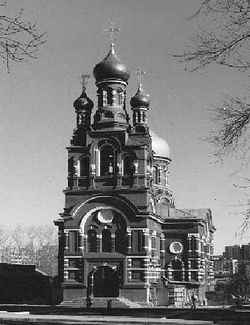
Certainly, we have a proverb. “Where there are
people, there are passions.” And passions are like
clouds that embrace your soul, particularly when you
forget God in your communications with other people.
Associating with other people influences you, and often
your mind is darkened with unnecessary words and notions.
Therefore, it is very important for your heart to be able
to find moments of solitude. We are to organize our day in
such a manner that we are like St. John of Kronstadt.
Although constantly surrounded by crowds of people, he
nevertheless managed to isolate himself for one
hour,
two hours, and during this time he prayed attentively,
with great force from his heart.
RtE: What would you characterize as the heart of your parish?
Fr. Artemy: I hope that the heart of our parish is the
Holy Chalice. We have many people who constantly try to
prepare themselves for Holy Communion. Certainly, this is
the heart, the center of spiritual life, and one of the
main tasks of the priest is to sustain this spiritual
thirst; to help people to satisfy this thirst by means of
attentive confession, sermons, and the priest’s own
inner constitution. We certainly know that souls are
connected through the liturgy, and that the spiritual
state of the priest is one of the most important elements
of church life. In Russia people like batiushkas very
much, and they can forgive their priest everything, all of
his faults. If you are enormous, formidable, bald, or if
you do not know any rules of “bon ton,” you
will be forgiven! Or if Batiushka is very fond of
technical things like computers (I don’t like
computers) you will be forgiven everything-on one
condition-that you pray, that you try to become a man of
prayer. Perhaps you can’t pray, but you are at least
to have as your ideal, the Prophet Moses, who was the
intercessor of the Israelites before God. We Russian
batiushkas are often afraid when simple people, perhaps
some old ladies, approach us, crying out, “Oh
Batiushka, you are so much closer to God than we are. Ask
Him please … for my nephew, for my
daughter….” Here they utter very, very
fearful words, responsible words… “closer to
God.” Often people say, “Batiushka, if you
have a possibility, pray please for this person. If you
have time, please commemorate his name once or
twice.” Russian batiushkas are to answer,
“Perhaps we have no time for other earthly things,
to plant vegetables, to build houses, to travel to America
…but we are to take time to pray.”
(…Fr. Artemy pours wine from his neighbor’s
glass to his own.) You are too slow. We in Russia seem not
to respect les droits de l’homme [human rights], and
with no hesitation we do things like this. It is a
violence of one’s rights. We transgress their
independence mercilessly. (Laughter around table as he
pours from glass to glass.) It is a mystery of our Russia.
RtE: Father Artemy, what do you think brings foreigners to Orthodoxy when visiting or working in Russia?
Fr. Artemy: Perhaps it is because our earthly life is so terrible here that you just have no other way out than Orthodoxy. It is the last gasp of a sinking man. If we had no Orthodoxy in Russia, I think that Russia would be a nightmare. It is a nightmare without Orthodoxy. Feodor Mikhailovich Dostoyevsky said, “Russia without belief, without truth in Christ, is copulation and cruelty.” This is because demons don’t sleep and if the Russian people reject a pious life they immediately become possessed by passions. These possessions are not hidden behind the smooth exterior of Western culture, everything is very open here.
RtE: It seems that when foreigners who have not yet found what they are searching for in America or Europe, come to Russia, religion isn’t so frightening to explore because it is part of the new culture.
Fr. Artemy: Certainly, we believe that our foreign guests feel the unknown sanctity of spiritual life here. Orthodoxy has the quality of permeation, and you can feel that people here badly need God. When I asked our well-known spiritual father, Fr. Ioann Krestiankin from Pskov-Pechory Monastery, “Should I visit Europe or not?” he did not say “Yes” or “No,” he answered, “It is only Russia that is aching for God.” Of course, every soul longs for God regardless of its origin, but certainly in Russia we have people who try to pray with all their hearts. They make their best effort to call out to God. It is not something unusual here. It is not philosophical, it is not a cultural tradition, it is simply your pain. Certainly, the Holy Fathers teach that if your prayer is without pain, without effort, without some invisible cry, it is not a real spiritual child, but a stillborn. St. Isaac of Syria says that prayer is always something painful, because sin impedes your prayer and prevents you from attaining a high quality of prayer.
RtE: What do you think brings foreigners to the church here at Krasnoselskaya? Obviously your ability to speak English and your willingness to reach out to them is important…
Fr. Artemy: My ability to speak English diminishes every year… We in Russia are always attentive to foreigners but this is not a virtue, it is even something suspicious. We may be indifferent to our compatriots, inattentive and even callous, but when we see a foreigner… ahhh! …what he thinks of us, what he will say about us, what will his first and last impressions be… I don’t know why, but when we see a foreigner we become cherubim with wide-open eyes. It is our failing. Nevertheless, when you think that this soul is very far from its homeland, very far from his or her parents, very far from his compatriots, and, at the same time, you realize that this soul’s first desire is God, revealed in Orthodoxy, then, of course, you want to help… particularly when you remember that the spiritual foundation of Europe is Orthodox Christianity. You feel a great pity for people who only know something distorted. You would like to help them touch the real ground of salvation. The foreigners I have met in Russia are very good listeners, because they are mostly people who appreciate culture, who are educated, refined (in the good sense of the word) and are very attentive to the manifestations of spiritual life. Perhaps it is God’s Providence that these people do not arrive in Russia accidentally. They are souls known by God, Who wants to instruct and enlighten them.
RtE: Why do you think your very traditional church is so attractive to non-Orthodox foreigners?
Fr. Artemy: Real tradition is a force and you cannot help but feel this spiritual force. In Orthodoxy, tradition is not a museum filled with interesting exhibits, but a stream you are to immerse yourself in. The more material things we have the more illusory our visible life is, but our hearts can find peace only in Christ. Western hearts are tormented by this comfortable way of living, and to feel anything deeply many Western people seek for vivid impressions. For example, one Russian girl I know was invited to visit Russian Orthodox friends who are now part of the French culture. On an excursion to the country in southern France the family began jumping into a river from a great height. There were rocks below, and if you didn’t jump far enough you would be dashed on the rocks. The father, mother, children…all jumped into the river. It was a real taste of life for them. For the Russian girl it was a dreadful experiment, and she refused to jump because it was such a great risk. This seeking for vivid impressions is a surrogate for spiritual life. The other aspect of Western people is that they are looking for eternity, for heavenly grace, and many people who are searching, who were poisoned by the absence of grace, are open to receiving it here.
RtE: The Russian people in your parish also seem particularly open to foreigners, although they themselves are traditional and uninterested in pursuing Western values and goals. Why do you think this is?
Fr. Artemy: Russian people are often welcoming, it is our
way. Also, we are always to discern, to make a distinction
between a person and his style of life, his world-view,
his practical philosophy. Priests especially must do this
if they are to feel your soul, and your soul is something
of great value. We are all children of our Heavenly
Father, therefore we are to discern the eternal soul in
our neighbour.
RtE: How do you reach out to a new soul that comes to you
from abroad, particularly if they are not Orthodox?
The best thing is to apply metalogical proof that God exists. This means that we don’t need to exercise our intellectual pretensions, but, for example, if a Buddhist approaches you who is interested in Russian culture, who would like to know something new about the meaning of life, the metalogical way of proving that God exists is to take a sweet and give this sweet to him, praying, “In the name of the Father, and of the Son, and of the Holy Spirit.” Then, it is not a simple sweet, it is a gift of the personal God, the living God, and he feels the reality. For almost all modern people, the life of their soul manifests itself in intellectual work, but the souls themselves are asleep. The treasure of our hearts is hidden, latent. There is only one key that you may use to open that treasure-love in Christ. Love in Christ is not a clever word, it is not a syllogism. You may speak with a person, not even discussing important matters, but if you try to give your heart, he will feel and cognize something yet unknown. This is because all human souls are connected. We are tied, we are like connecting channels, and the level of water, as Pascal says, is the same in the neighboring channels. When you love, the other will want to love also. When you cry, he will also cry. When you pray, he will feel something unknown even if he is not a believer, unless his heart is closed by pride.
RtE: Many of the foreigners that come to your church are visiting or working in Russia from Western Europe or North America-countries that are both less traditional and often more consumer oriented. What do you find in the psychological formation of Westerners that makes it easy for them to enter into Orthodoxy? What things in their make-up are stumbling blocks that make it difficult to take on an Orthodox world-view?
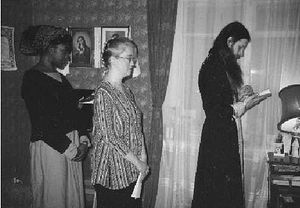
RtE: You say that Western people have a rather direct obedience. Do you believe that this is the kind of obedience that leads to a deeper spiritual obedience, the obedience to spiritual authority?
Fr. Artemy: This is not only a problem for Western people. One of our spiritual writers, Fr. Nikon Vorobyov, who was connected to the Optina Elders and lived until the 1960’s in the town of Kozelsk, said in one of his letters that, in his long life as a priest he had never seen a spiritual father in the proper sense of the word, or a spiritual child who could be truly obedient. This is certainly true. Very often people ask, “Do you know any living elders in Russia?” Or they ask, “Why are there so few elders alive now?” The very wise answer is, “As we have no novices, we have no elders.” You must learn to be obedient to become a man of spiritual depth. If you have no school of spiritual obedience, how will you be able to rule others? Now, in our modern way of life, we don’t meet humility and spiritual poslushaniye [obedience]. Certainly, it is not an easy thing to get an idea of spiritual obedience to Christ, to His Church, if from childhood you were brought up with one aim-to find pleasure, to satisfy your capriciousness, to think that because you want something it is justifiable. Certainly, the most essential thing is chastity. I remember an Englishspeaking girl from New Zealand. She came here to learn Russian. Her two friends in Moscow were girls from Russian Orthodox families in Australia. (One of them now is in Gethsemane Monastery in Jerusalem, the other married a pious Russian man in Australia.) Their friend from New Zealand had been baptized in the Protestant tradition. She told me that her pastor had taught them that if you love from your heart, everything is permissible. In your relations with boys, if you do not have love in your heart it is not Christian, but if you love, you can sleep with him. He was a Christian pastor, but they had no idea of chastity as the fundamental Christian virtue.
Certainly, when you become a believer, when you begin to pray, everything inside of you rebels against the teaching of heavenly grace. This is one of the main battles we must wage, with this fallen spirit of lust. Unfortunately, most of us were bitten by this snake in our youth, and we priests know exactly the state of deep desperation, the lack of vital energy that visits you when you begin praying and struggling with the spirits of lust. They cover you with a veil, with a cloud of some inner death, and you have to be very trusting and courageous, to have a strong hope in Christ to overcome this obstacle. Therefore, it is a very difficult thing for our youth that want to become Christian, to become victors, and the root of our disobedience is this lust, in the wider sense of the word. We are accustomed to satisfy our earthly desires and needs. We are consumateurs of earthly goods. True spiritual treasure requires us to reject this point of view, to become ascetic, and certainly, everything is possible if you love Christ. He reveals Himself to you, to your soul, and instructs you with His grace. God is much stronger than the grasping, earthly tentacles that try to ensnare us.
RtE: We have so many young people in America and Europe who are just beginning to wake-up spiritually. What kind of practical steps would you suggest to help them avoid the permissiveness, consumerism and lust?
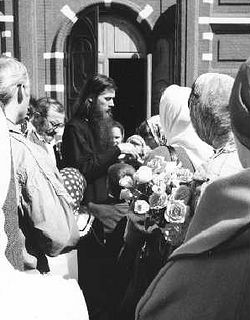
I think that the most important thing for a priest is to have the inner authority to speak about Christ. If you don’t have this inner authority, you don’t dare because you will always cause harm. A priest without the inner authority to preach will only destroy.
It is a paradox. Certainly, the sacraments are valid, they are not dependent on our moral state, but as for preaching and your desire to help, everything will be distorted if you don’t have this inner sanction. The passions will distort your words. The more you try to live in Christ, the more discreet becomes your attitude towards people.
And now I ponder, “What is the golden mean between the necessity for solitude in prayer and our duty as priests to teach, to help?” You may develop a high degree of activity; social, cultural, political, spiritual (so to speak), but if you have no feeling of God, if you don’t stand before the face of God, if you don’t recollect the feeling of His presence, your activities are not so useful. I think this is the main problem in Russia now. In many places material conditions have matured enough to open churches, to activate parish life, but the real need is for priests (and Christians), whose word is anointed with inner salt, who live in God and with God.
RtE: Many of us from the West whose lives are filled with material cares, find ourselves not only not anointed with inner salt, but struggling with insensitivity and hardness of heart. Can you say something about this?
Fr. Artemy: Holy Fathers, such as St. John Cassian, say that hardness of heart is a very useful thing. We need it very much, for when you find yourself in this state, you realize what you are in reality. To bear this stone in your heart is the way to humility, because then you begin to pray and your prayer is authentic. You complain, you confess your infirmities, you demand support… To struggle with this infirmity means, first of all, to take the opportunity for constant confession. If we have no mortal sins, this state is the result of our life outside the Church, of giving into worldliness. Our heart is very tender, and before we entered the Church it was filled with earthly lust. That lust has killed our heart, has made it not light and free, but hard and dark. The way to oppose this short-coming is to be grateful to God, as St. Job was grateful not only for good things, but also for bad, and to be steadfast in your gratefulness. Certainly this ordeal of gratefulness, of patience, will gain us victory because our wisest teacher, our Saviour Jesus Christ, knows what is useful for us. When His grace appears absent it does not mean that He has left us.
Certainly, it is necessary for every real Israelite to make his journey through the desert, and this is the only way to God. Very often we sin, and then we feel that we have no boldness before God. When we sin, we become deaf and dumb. (I don’t mean sins that we commit willingly, but out of habit, or through our relaxation.) So, if you feel that you have sinned, and you want to feel once again that you have wings, you are not only to repent your sins, but you are to be very, very loving to other people. This is the surest way to spiritual freedom and to overcoming hardness of heart. When we are arrogant or judgmental, we will of necessity suffer in this state, but when we are persuaded by our sins that we are sinners, we will not judge other people but will be tolerant, patient, and sympathetic with them. If you understand the essence of this endeavor, you will very soon feel a change in your heart. When you are warm and open to other people and try to carry their burdens, you will open your heart to heavenly grace.

